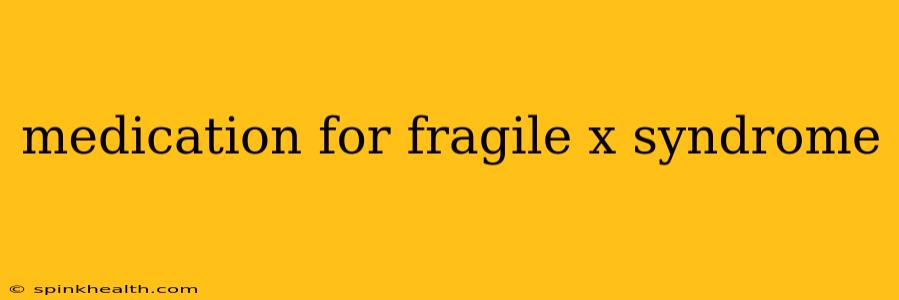Fragile X syndrome, a genetic condition impacting cognitive development and behavior, often presents a complex tapestry of symptoms. While there's no cure, various medications can significantly alleviate associated challenges. This journey into the world of Fragile X medications isn't about a magic bullet; it's about finding the right tools to improve quality of life for individuals affected. Let's explore the landscape of treatments, addressing common questions and concerns along the way.
What are the common behavioral symptoms of Fragile X Syndrome that medication targets?
Many individuals with Fragile X syndrome experience a range of behavioral challenges. These can include hyperactivity, impulsivity, anxiety, attention deficit hyperactivity disorder (ADHD)-like symptoms, and autism spectrum disorder (ASD) traits. Medications are often prescribed to manage these behaviors, aiming to improve daily functioning and interaction. The specific medication and dosage depend greatly on the individual's unique symptom profile and response to treatment. It's a carefully tailored approach, not a one-size-fits-all solution.
What medications are commonly used to treat behavioral issues in individuals with Fragile X Syndrome?
Several medication classes are often used to address the behavioral challenges associated with Fragile X syndrome. These include:
-
Stimulants: Often used to manage ADHD-like symptoms, stimulants like methylphenidate (Ritalin) and amphetamine (Adderall) can help improve focus, attention, and reduce hyperactivity. However, careful monitoring is essential due to potential side effects.
-
Non-stimulant ADHD medications: Atomoxetine (Strattera) is a non-stimulant option that can be beneficial for individuals who don't respond well to stimulants or experience significant side effects.
-
Antidepressants: Selective serotonin reuptake inhibitors (SSRIs) such as sertraline (Zoloft) and fluoxetine (Prozac) can be helpful in managing anxiety, depression, and obsessive-compulsive behaviors. They can also help regulate mood swings, a frequent occurrence for some.
-
Antipsychotics: Atypical antipsychotics, like risperidone and aripiprazole, might be used to manage aggression, self-injurious behaviors, or repetitive behaviors, especially in those with more severe symptoms. Their use is often reserved for situations where other treatments haven't been effective and requires careful monitoring due to the potential for side effects.
What are the potential side effects of these medications?
It's crucial to understand that medications, while beneficial, can come with side effects. These can vary depending on the individual and the specific medication. Common side effects can include:
- Stimulants: Insomnia, decreased appetite, headaches, stomach aches.
- Non-stimulants: Decreased appetite, nausea, fatigue, sleep problems.
- Antidepressants: Nausea, headache, sleep disturbances, weight changes.
- Antipsychotics: Weight gain, drowsiness, increased appetite, movement disorders (in some cases).
It's imperative to work closely with a physician to monitor for and manage any side effects. Open communication is key to ensuring the best possible outcome.
Are there any non-medication approaches to managing Fragile X Syndrome symptoms?
Absolutely! While medication plays a crucial role for many, non-medication approaches are equally vital for holistic management. These include:
-
Behavioral Therapy: Applied behavior analysis (ABA) therapy is a cornerstone of intervention, focusing on modifying behaviors through positive reinforcement and structured learning.
-
Occupational Therapy: Helps develop fine motor skills, improve daily living skills, and address sensory sensitivities.
-
Speech Therapy: Addresses communication difficulties, improving language skills and social communication.
-
Educational Support: Specialized educational programs and individualized learning plans are essential for academic success.
A multi-disciplinary approach, combining medication with comprehensive therapeutic interventions, often yields the best results.
How are medications chosen for individuals with Fragile X Syndrome?
The selection of medications is a collaborative process. A physician specializing in developmental disabilities or neurology, often in conjunction with a psychiatrist, will carefully evaluate the individual's specific symptoms, medical history, and overall health before prescribing any medication. Regular monitoring of medication effectiveness and side effects is crucial, with adjustments made as needed. The journey is iterative and personalized.
This information is for general knowledge and does not constitute medical advice. Always consult with a healthcare professional for diagnosis and treatment of Fragile X syndrome or any related concerns. Remember, finding the right approach is a journey, not a destination. With careful monitoring and a comprehensive strategy, you can help improve the quality of life for individuals affected by this condition.

